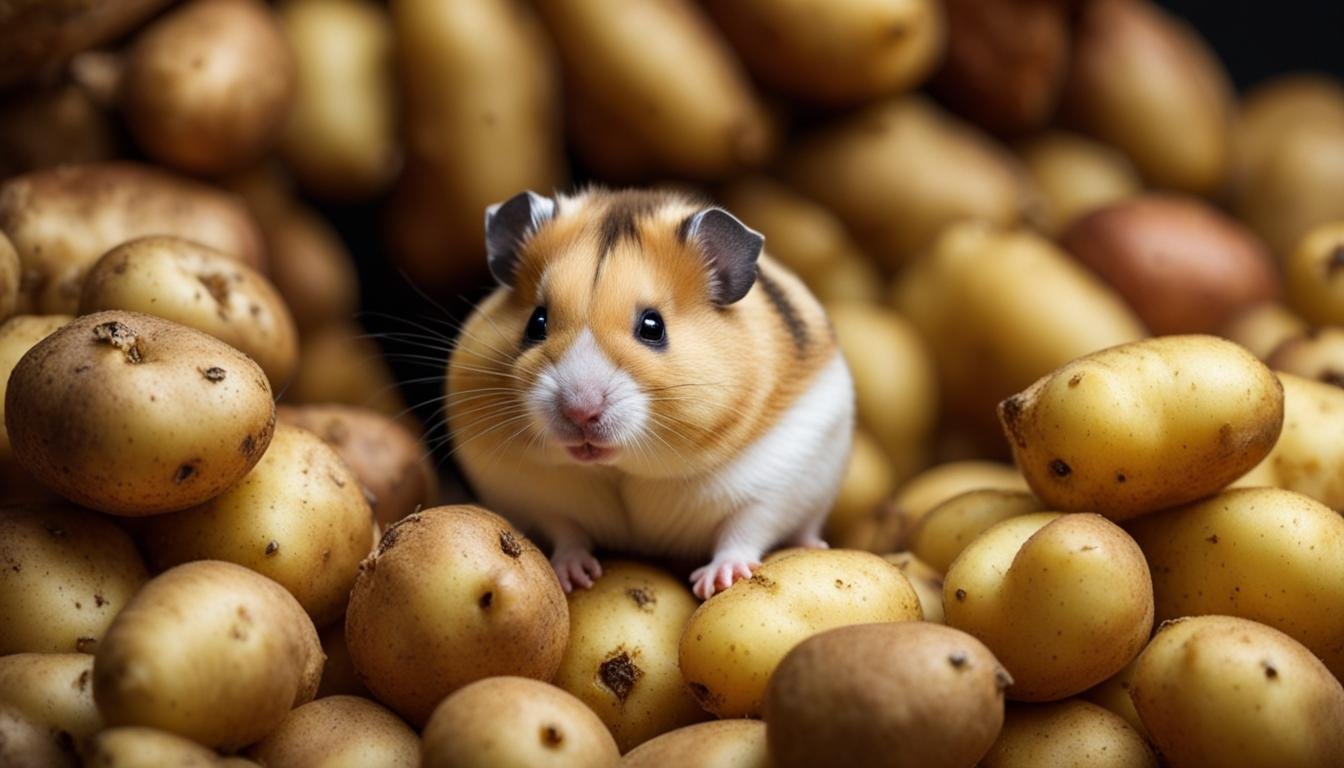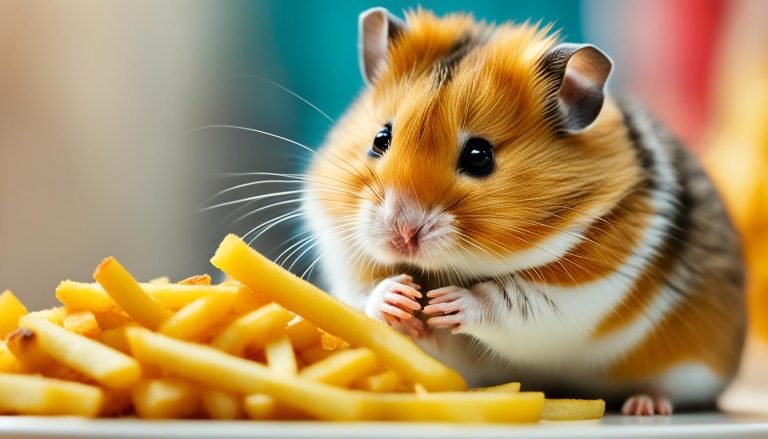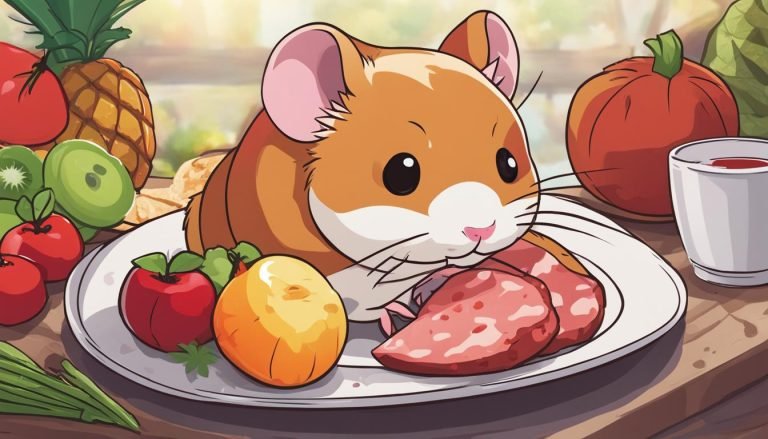Can Hamsters Eat Potatoes? Safe Snacks Explained
As a responsible hamster owner, I’ve always wondered if potatoes are safe for my little furry friend to munch on. After doing some research, I’m happy to share what I’ve learned about feeding potatoes to hamsters.
So, can hamsters eat potatoes? The answer is yes but with a few important considerations.
Potatoes can be a part of a hamster’s diet, but they should be cooked before being offered to your pet. Raw potatoes can be difficult for hamsters to digest and may lead to digestive issues. By cooking the potatoes, you make them easier for your furry friend to consume and enjoy.
When it comes to feeding hamsters, it’s essential to provide a balanced diet. This means including a variety of foods that contain carbohydrates, protein, fat, and fiber. Potatoes can contribute to the carbohydrate component of your hamster’s diet, providing them with much-needed energy.
However, it’s crucial to be mindful of portion sizes. Hamsters are small creatures, and overfeeding them can lead to obesity and health problems. A general guideline is to offer no more than 3 grams of potato per day, which is roughly a ½ inch cube. Moderation is key to ensuring your hamster stays healthy and happy.
Key Takeaways:
- Hamsters can safely eat cooked potatoes as part of a balanced diet.
- Raw potatoes should be avoided, as they can be difficult to digest.
- Provide potatoes in moderation, as portion sizes should be small to prevent obesity.
- Cooked potatoes can contribute to a hamster’s carbohydrate and energy needs.
- Remember to offer a variety of foods to ensure your hamster receives all the necessary nutrients for a healthy life.
What Do Hamsters Eat in the Wild?
In the wild, hamsters have a diverse diet that consists of various foods to meet their nutritional needs. They forage for grains, seeds, nuts, cracked corn, plant leaves, stems, berries, flowers, insects, small reptiles and amphibians, and even eggs. Their diet is naturally balanced with the right proportions of carbohydrates, protein, fat, and fiber.
Replicating the natural diet of hamsters in the wild is essential when feeding pet hamsters. Providing them with a wide range of foods that are similar to what they would find in their natural habitat ensures they receive the necessary nutrients for their well-being.
Hamsters are opportunistic eaters and are adapted to a variety of foods. By offering them a diverse selection of natural hamster food, you can help promote their overall health and provide them with an enriching eating experience.
Benefits of Potatoes for Hamsters
Potatoes are not only a tasty treat for humans, but they can also offer some health benefits for our furry friends. Hamsters, being omnivorous animals, can safely consume potatoes as part of their diet. Let’s explore the nutritional value and potential advantages that potatoes bring to hamsters.
Potatoes are a good source of starch, which is a complex carbohydrate that provides energy for hamsters. This energy is essential for their daily activities and overall well-being. In addition to being a source of energy, potatoes also contain resistant starch, which acts as fiber in the large intestine.
Resistant starch is known for its ability to feed the microbiome, which refers to the community of beneficial bacteria in the gut. Research has shown that a diet high in resistant starch can have positive effects on health in humans, such as lowering cholesterol and triglyceride levels and increasing insulin sensitivity.
While there is limited specific research on the effects of resistant starch in hamsters, it is plausible to assume that they may experience similar benefits. Feeding potatoes to hamsters can potentially contribute to a healthy digestive system and support their overall well-being.
To ensure the safety and optimal health of your hamster, it’s important to provide a varied and balanced diet. Potatoes should be offered in moderation as a supplement to their primary diet, which should consist predominantly of hamster pellets, fresh hay, and water. With the right portion size and a diverse range of other suitable foods, potatoes can be a healthy addition to your hamster’s diet.
How Much Potato Can Hamsters Eat?

When it comes to feeding potatoes to your hamster, portion size is crucial. As an owner, you must ensure you provide the right amount of potato to meet your hamster’s nutritional needs without overfeeding or causing any health issues.
The calorie requirement for most hamsters is around 25 kcal per day, and vegetables can make up about 5 kcal of their diet. This means that potatoes should be consumed in moderation to prevent excessive calorie intake. Ideally, hamsters should have no more than 3 grams of potato per day, which is roughly equivalent to a ½ inch cube.
It’s important to remember that potatoes should be part of a balanced diet and not the sole food source for your hamster. They should be supplemented with other appropriate foods to ensure your pet receives all the necessary nutrients. A variety of fresh fruits, vegetables, and animal proteins can be included in your hamster’s diet to provide a well-rounded nutrition.
By following proper portion sizes and offering a balanced diet, you can ensure that your hamster enjoys the benefits of potatoes without any adverse effects on their health.
If you’re unsure about the specific dietary needs of your hamster, it’s always best to consult with a veterinarian who specializes in small animals. They can provide you with personalized guidance and recommendations based on your hamster’s unique requirements.
Offering Potatoes to Hamsters
When it comes to feeding potatoes to your hamster, there are a few important things to consider. First and foremost, make sure that the potatoes are cooked fresh and free of any butter, oil, or seasonings. These additives can be harmful to your furry friend’s delicate digestive system.
Leaving the skin on the potatoes can provide some additional benefits for your hamster. The skin is a good source of fiber, which aids in digestion and promotes a healthy gut. So, if your hamster doesn’t mind the texture, it’s a good idea to leave the skin on when offering potatoes.
In addition to regular white potatoes, it is also safe to feed sweet potatoes to hamsters. Sweet potatoes belong to a different plant family and have fewer calories compared to white potatoes. They are a nutritious alternative that your hamster may enjoy.
Remember, moderation is key when feeding potatoes to your hamster. While they can provide some nutritional benefits, it’s important to offer a balanced diet that includes other safe foods as well.
Next, let’s explore some other foods that are safe for your hamster to enjoy!
Other Foods for Hamsters
Aside from potatoes and sweet potatoes, hamsters can enjoy a variety of safe and healthy foods in their diet. Including fruits and vegetables in their meals is an excellent way to provide essential vitamins and nutrients. Here are some examples of safe foods for hamsters:
- Leafy Greens: Spinach, kale, and lettuce are all excellent choices.
- Carrots: These crunchy delights are great for hamsters to munch on.
- Peppers: Bell peppers, in various colors, offer a burst of flavor.
- Broccoli: A small floret or two can be a nutritious addition to their diet.
- Apples: Fresh slices, without the seeds, make a tasty treat.
- Strawberries and Blueberries: These berries add a sweet touch to their diet.
Additionally, hamsters can also benefit from the inclusion of animal proteins in their diet. Mealworms, crickets, cooked chicken, and boiled eggs provide the necessary protein requirements for their overall health and well-being. However, it’s important to avoid certain foods that can be harmful to hamsters. These include sugary or salty foods, rhubarb, citrus fruits, garlic, onions, chocolate, red meat, and dairy products.
Providing a balanced and varied diet is crucial for ensuring the optimal health of your hamster. Offering a variety of safe foods from different food groups not only meets their nutritional needs but also keeps their diet exciting and enjoyable. Remember to introduce new foods gradually and observe how your hamster responds to them. With the right combination of safe foods, hamsters can lead happy and healthy lives.
Final Thoughts
In summary, hamsters can safely enjoy potatoes as part of their diet, as long as the potatoes are cooked and offered in moderation. Potatoes provide hamsters with a source of energy and potentially offer health benefits due to their resistant starch content. However, it is crucial to consider portion sizes and maintain a balanced diet to prevent overfeeding and ensure overall nutritional needs are met.
While potatoes can be a suitable option for hamsters, many other safe and nutritious foods can be included in their diet. Leafy greens, carrots, peppers, broccoli, apples, strawberries, and blueberries are just a few examples of fruits and vegetables that can be provided to hamsters. Additionally, small amounts of animal proteins such as mealworms, crickets, cooked chicken, and boiled eggs can be offered to supplement their diet.
By offering a variety of safe foods and maintaining portion control, hamster owners can ensure that their furry friends receive the necessary nutrients for a happy and healthy life. Remember to consult with a veterinarian for personalized dietary recommendations based on your hamster’s specific needs and health condition.
Similar Posts
- Can Hamsters Eat Pistachios? Safe Snacks Guide
- Can Hamsters Eat Mushrooms? Safety Guide
- Can Hamsters Eat Mealworms? Safe Snack Guide
- Can Hamsters Eat Crackers? Safe Snack Tips.
- Can Hamsters Eat Asparagus? Safe Feeding Guide
- Can Hamsters Eat Peaches? Safe Snacking Tips
- Can Hamsters Eat Cilantro? Safe Herb Guide
- Can Hamsters Eat Cantaloupe? Find Out
- Can Hamsters Eat Avocado? Diet Safety Tips
- Can Hamsters Eat Pineapple? Safe Snack Guide
- Can Hamsters Eat Green Beans? A Complete Guide
- Can Hamsters Eat Blackberries? Safe Treat Tips
- Can Hamsters Eat Blackberries? Safe Treat Tips
- Can Hamsters Eat Popcorn? Safe Snack Tips
- Can Hamsters Eat Salami? Here’s Why Vets Say No







